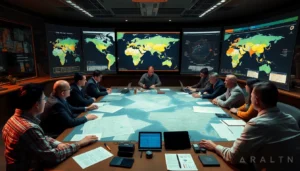Table of Contents
ToggleIn a world where borders blur and global issues take center stage, a global affairs degree is like a passport to endless opportunities. It’s not just about studying international relations; it’s about diving into the deep end of diplomacy, economics, and cultural exchanges. Imagine discussing climate change over coffee with a future UN ambassador or strategizing solutions for global inequality with a future world leader. Sounds fancy, right?
But let’s be real—this degree isn’t just for aspiring diplomats or future world changers. It’s for anyone who wants to understand the chaotic yet fascinating web of global interactions. With a global affairs degree, students gain critical thinking skills and a knack for problem-solving, making them the superheroes of the job market. So, if you’re ready to tackle the world’s biggest challenges while looking good doing it, this might just be the degree for you.
Overview of Global Affairs Degree
A global affairs degree offers insights into the interconnected world and its complex issues. This degree equips students with tools to navigate various global challenges effectively.
Definition and Purpose
A global affairs degree focuses on understanding international relations and global interdependencies. Its primary purpose is to prepare students for careers that tackle major global issues. Students engage with topics like diplomacy, development, and international economics. They learn to analyze the impact of policies on different regions. Graduates often work in governments, NGOs, and international organizations. This degree promotes critical thinking, enabling students to approach global challenges strategically.
Key Components of the Curriculum
Core components of a global affairs curriculum include courses on international relations, political science, and economics. Students typically study global governance and public policy to understand institutional frameworks. Development studies often highlight socioeconomic challenges in different regions. Students also engage in research methods to enhance analytical skills. Foreign language proficiency is frequently emphasized for effective communication across cultures. Internships or practical experience provide real-world exposure, further enriching their education.
Benefits of Obtaining a Global Affairs Degree
A global affairs degree offers several advantages in today’s interconnected world. Students gain the knowledge to navigate complex international issues and access various career paths.
Career Opportunities
A global affairs degree opens doors to numerous roles across sectors. Graduates find positions in government agencies, non-profit organizations, and international corporations. Careers may include roles such as diplomats, policy analysts, and international development specialists. The diverse skill set enables professionals to work within national security, environmental policy, and humanitarian efforts. Firms appreciate candidates with global insight and cultural competence, enhancing employability in a competitive job market.
Skill Development
Skill development remains a crucial aspect of a global affairs degree. Critical thinking and analytical abilities grow through engaging with complex global issues, preparing graduates to tackle real-world challenges. Communication skills improve significantly, allowing students to articulate policies effectively and engage in dialogue with diverse audiences. Research skills also develop as students examine international case studies and conduct independent studies. Learning foreign languages further enhances communication and cross-cultural understanding, making graduates versatile assets in the global workforce.
Popular Specializations within Global Affairs
Numerous specializations within a global affairs degree cater to diverse interests and career goals. Each area enhances understanding of specific global challenges.
International Relations
International relations focuses on the dynamics between countries, international organizations, and non-state actors. Students study diplomatic strategies, security policies, and conflict resolution methods. Understanding geopolitical trends becomes crucial, as do the historical contexts that shape current international decisions. Courses in this specialization often cover topics like international law and human rights. Graduates pursuing this path can secure roles as diplomats, foreign affairs analysts, or international relations consultants.
Development Studies
Development studies examine global socioeconomic challenges, emphasizing sustainable development and poverty alleviation. This specialization equips students with tools to address fundamental issues like education, health, and governance. Coursework typically involves analyzing case studies of development initiatives and evaluating policy impacts on communities. Graduates can work with non-governmental organizations, international agencies, or policy think tanks, focusing on creating effective development solutions. Understanding these frameworks enhances their ability to influence positive change in vulnerable populations.
Choosing the Right Institution
Choosing the right institution for a global affairs degree significantly influences career outlook. Several factors come into play when making this decision.
Accreditation and Reputation
Accreditation assures students of a program’s quality and recognition. Recognized institutions meet specific educational standards, enhancing credibility. Schools with strong reputations often provide better networking opportunities. They may also connect students with influential alumni working in various sectors. A program’s ranking in national or international listings can further inform choices, as higher rankings typically indicate better resources and faculty. Researching alumni outcomes adds another layer of insight, showcasing the pathways graduates have taken.
Online vs. On-Campus Programs
Online programs offer flexibility, allowing students to balance work, study, and personal commitments. Many students appreciate the convenience of studying from anywhere, which can widen geographic accessibility. On-campus programs usually provide direct access to professors and campus resources, creating opportunities for hands-on experiences. Networking and collaboration often thrive in a physical classroom setting, enriching the educational experience. Students need to weigh the benefits of each format based on their learning styles and career goals.
A global affairs degree opens doors to a multitude of career paths in an interconnected world. Its comprehensive curriculum equips graduates with essential skills to tackle pressing global issues. With a focus on critical thinking and practical experiences, students emerge as adaptable professionals ready to make a difference.
Choosing the right program can enhance networking opportunities and career prospects. As global challenges continue to evolve, the demand for knowledgeable individuals in this field will only grow. Pursuing a degree in global affairs not only prepares students for diverse roles but also empowers them to contribute meaningfully to society on a global scale.






